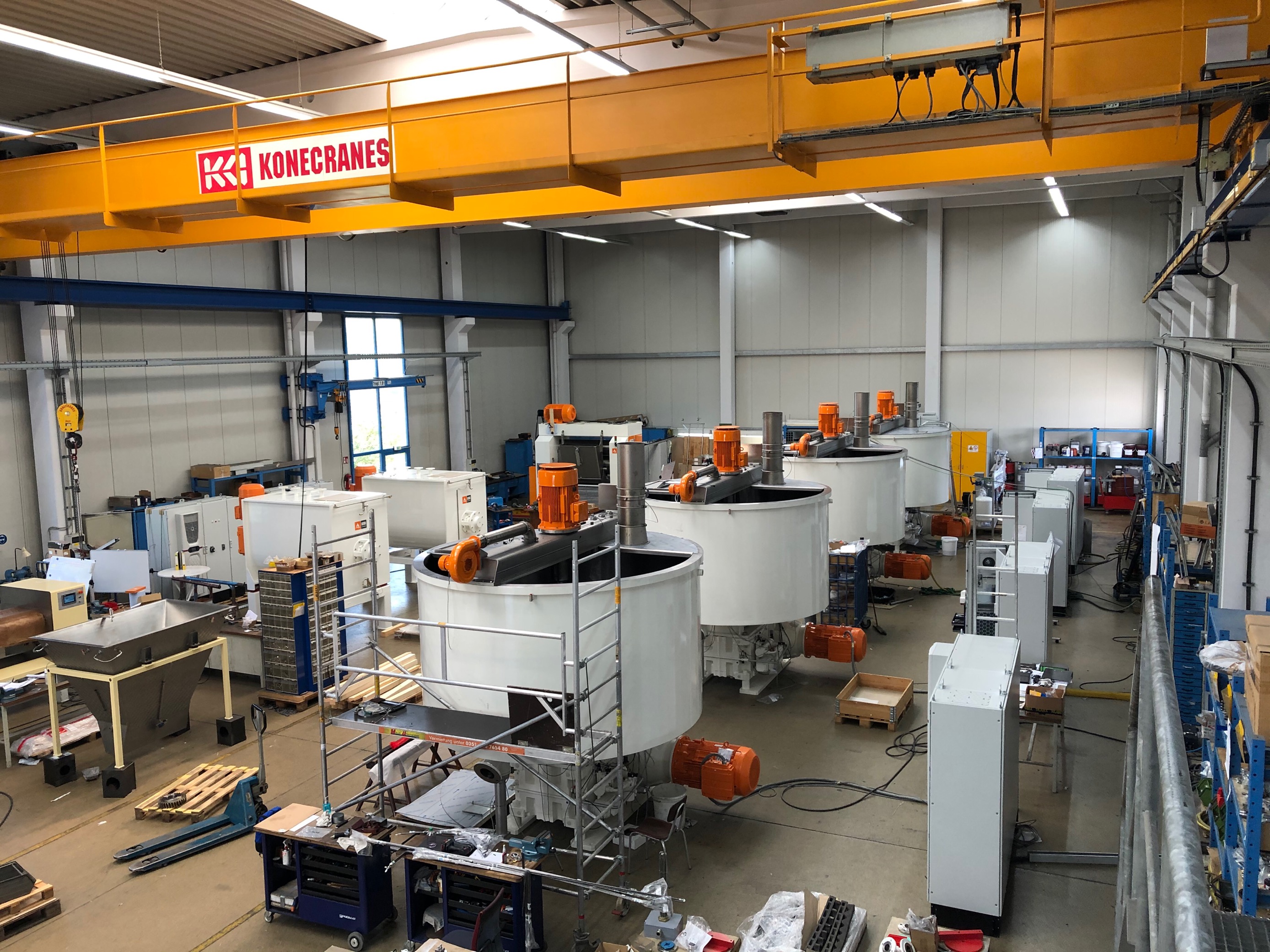International Confectionery sits down with Dr. Tobias Lohmüller, Director of R&D and Design at Hamburg Dresdner Maschinenfabriken GmbH (HDM) to discuss his approach of less traditional methods in business.
Could you tell us what a day in the role of Technical Director at HDM is like? What daily challenges do you face?
HDM is in a situation of tremendous change with lots of innovations going on to fulfil customer needs, of course with vigour, but especially with smart solutions which these new approaches clearly necessitate.
Classical operative management topics and close personal management with different departments is, of course, the base of my role. However, my passion is to initiate disruptive thinking, promote smart solutions and challenge “traditional” approaches in order to create new value-oriented innovations; also that includes in-house processes, and process optimisation such as installing an “assembly to order” (ATO) structure for main machinery.
A close relationship to the customers is key to accelerate the business and to identify strategic innovation potential, bringing value to the customer. One critical success factor of the HDM group is certainly the attitude and culture of widening the horizon. Due to the positive ‘can do’ culture, operative excellence, innovation and customer focus the company is generating worthwhile customer satisfaction.
As Technical Director it is important to be an example regarding cultural values. In order to define a mid- and long-term product business strategy, it is necessary to formulate clear targets and a final “vision” for the future. Targeting transparent communication is to create collective ownership of the idea for the business development; and finally, it is necessary to create an optimal working environment by prioritisation of working tasks so that the people can achieve their targets.
Currently, my main challenge is to streamline processes in order to give people the freedom to design innovative, smart solutions; fortunately, the team is embracing this out-of-the-box approach and understanding such innovations are the key success factor for the company. However, process changes include also change-management in the mindset and needs to be accompanied too.

How have you implemented digitalisation and monitoring across the business? How will this help you in the future?
The main challenges on digitalisation, IOT solution or Industry 4.0 is to identify “Smart Data”. To monitor and track data is nowadays not difficult, all sorts of sensors are available and processing power is no longer a big issue. However, to identify the really relevant data which can give an added value to the customer is the real challenge. Firstly, in order to be able to identify relevant “Smart Data” one needs to fully understand the whole process from raw material up to the final product. Then one has to identify and understand the ‘white spots’, sometimes up to the molecular level, before one can evaluate if the digitalisation and process integration of these whites spots is worthwhile and generate customer value such as yield, efficiency, and operational excellence.
Most of the time, the low-hanging fruits are already picked and great innovation is not achieved by simply installing a sensor; therefore, one needs to identify new, measurable precursors and to link those to sensible correlation.
Furthermore, the work of the identification of “Smart Data” includes programming of algorithms up to AI level in order to come up with a good, sometimes disruptive, IOT solution. We have been working on several IOT solutions in the past two years that are already in the market or will be launched next year.
Our strength is our culture, deep process understanding and, in part, out-of-the-box thinking.
With this attitude, this year we have launched a “Quality Yield Cockpit” (QYC). This system allows the online monitoring of a winnowing system, a key process step for yield management. With the QYC, customers can increase the yield of a cocoa production factory of up to 1%. In numbers reflected this would mean that a 42.000 mT/annum plant can save around 1 M€ p.a. after installing this device.
We also finalised a “Flavour Monitoring Cockpit” FMC which is going to be industrially tested in the beginning of 2021. The FMC tool allows us to evaluate online the cocoa liquor and chocolate flavour quality linked to volatiles. This system shows for example, online the performance of a flavour refiner system for cocoa liquor (a thin-film treatment device) also it enables us to monitor and control for the first time the conching process in order to reduce conching time.
We are going to introduce additional intelligent systems for chocolate production, with the target to design a fully autonomous-running chocolate line in future. Two of the digitalisation systems for chocolate production are the “Throughput Optimisation Cockpit” (TOC) and the “Stripe Detection Cockpits (SDC)” for the chocolate “Five-Roll Refiner”.
Tell us in detail the different approaches to chocolate production at HDM and how these approaches have shown innovation in the sector?
The first step of chocolate production is the cocoa liquor production, that includes the roasting process. There are two alternative roasting processes on the market, one is bean roasting the other is nib roasting. Bean roasting is exclusively for cocoa liquor production whereas nib roasting is used for cocoa powder production also.
The chocolate production can be differentiated between a small-scale or a large-scale industrial production. For the smaller capacity we have an one-in-all machine the so called MacIntyre Refiner/Conche. The larger capacity line consists usually of a pre-refining, five-roll refining and, the final process step, conching.
In 2021, we are going to launch a new 4-6 mT Batch Drum Roaster which has the best energy transfer rate and fastest temperature control (to the benefit of throughput and taste) compared to all other competitors. The new FRD /2 will set new standards in terms of food safety which includes a clear separation of isolation material from the food processing zone. Furthermore, HDM is more recently promoting a continuous, convective roaster for high throughput alkalised nib roasting that is capable of processing up to 8mT/h since 2020. Not forgetting, the disruptive innovation of the QYC-System mentioned above, which allows customers to manage the winnowing performance online in order to obtain maximised yield while maintaining the expected quality.
Regarding chocolate production, we are focusing on efficiency and digitalisation; for example, HDM produces a Five-Roll-Refiner, the HFS 180 Super, with roller length of 1800 mm that can process up to 1.5mT/h chocolate at 20 µm, some 30% to 40% more throughput than comparable solutions by keeping the required energy per metric ton of product low. In contrast to the competition, HDM decided not to enlarge the length of the rolls and motor power to increase throughput, but to increase only the diameter of the top two rolls. This does not only result in high throughput but in unparalleled energy efficiency, extremely low wear and tear, and a minimal factory footprint requirement for such outputs.
For all of you interested in this topic, please take a look at our latest film illustrating all the innovative working principles of our five roll refiner: Five-Roll Refiners HFS – Refining – Chocolate Making – products | Hamburg Dresdner Maschinenfabriken (h-d-m.com).
Further innovations targeting autonomous processing in future such as the “Stripe Detection Cockpits” SDS or the “Throughput Optimisation Cockpit” TOC-System will be available as retrofit next year. With regard to the conching, we are focusing on specific energy consumption for shear forces allowing us to run a 6 mt batch PVS conche with 90 kW motor showing comparable butter and an outstanding cocoa flavour generation compared to other conches with an installed motor power of up to 160 kW.
The latest technology of the Flavour Monitoring Cockpit (FMC) allows customers, for the first time, to take full control of the process of volatile removal and flavour development within the conching process. Now, operators can optimise the conche parameters to compensate for raw material fluctuations and, more excitingly, to allow the conching process to calibrate itself for the conching time needed for a perfect flavour profile, instead of using a “one size fits all” conching profile. This intelligent, context sensitive process calibration allows us to increase throughput while safeguarding the expected flavour profile and quality.
How important is sustainability to the business? How is it implemented?
Sustainability is at the heart of what we do at HDM; it is not a coincidence that all our IOT solutions are designed to optimise output with a minimal usage of input resources, which ultimately results in sustainability and customer satisfaction.
How did COVID-19 impact the business, if at all?
Certainly, the larger projects slowed down since customers, as well as ourselves, needed some time to adjust to the new situation and our people were restricted in travelling and meeting customers in their facilities in person. Digital means of communication are great, and business goes on, but they cannot fully compensate for in-person teamwork and collaboration. Lucky for us, the single machine business was running within or even above expectations.
What trends do you see for the future of cocoa processing and liquid chocolate production?
In future, the cocoa business will focus even more on efficiency and yield, since the liquor and powder market is a highly competitive “C to C” market. The main challenge of this market is certainly the complexity of processing cocoa and yield management.
The gourmet chocolate market will certainly recover after the Corona Crisis. Therefore, the trend on product differentiation and creative specialties will start to grow again with a need for machines that allow for a wide range of volumes and flavour profiles. We will support our customers in these challenges by offering highly innovative chocolate and cocoa machinery with our autonomous, smart processing solutions.
To stay up to date on the latest, trends, innovations, people news and company updates within the global confectionery market please register to receive our newsletter here
Media contact
Kiran Grewal
Editor, International Confectionery
Tel: +44 (0) 1622 823 922
Email: [email protected]









